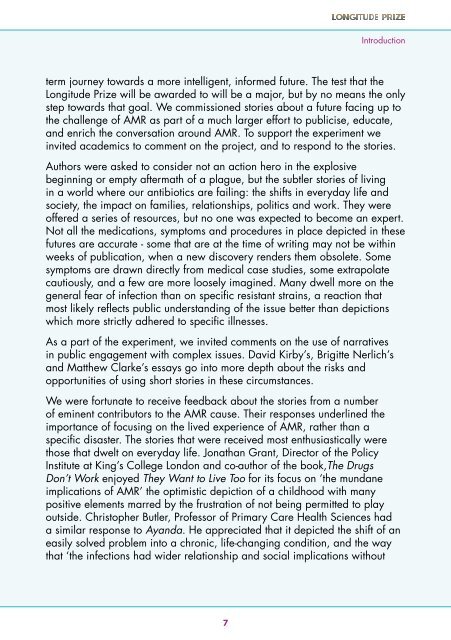FUTURES
infectious-futures
infectious-futures
You also want an ePaper? Increase the reach of your titles
YUMPU automatically turns print PDFs into web optimized ePapers that Google loves.
Introduction<br />
term journey towards a more intelligent, informed future. The test that the<br />
Longitude Prize will be awarded to will be a major, but by no means the only<br />
step towards that goal. We commissioned stories about a future facing up to<br />
the challenge of AMR as part of a much larger effort to publicise, educate,<br />
and enrich the conversation around AMR. To support the experiment we<br />
invited academics to comment on the project, and to respond to the stories.<br />
Authors were asked to consider not an action hero in the explosive<br />
beginning or empty aftermath of a plague, but the subtler stories of living<br />
in a world where our antibiotics are failing: the shifts in everyday life and<br />
society, the impact on families, relationships, politics and work. They were<br />
offered a series of resources, but no one was expected to become an expert.<br />
Not all the medications, symptoms and procedures in place depicted in these<br />
futures are accurate - some that are at the time of writing may not be within<br />
weeks of publication, when a new discovery renders them obsolete. Some<br />
symptoms are drawn directly from medical case studies, some extrapolate<br />
cautiously, and a few are more loosely imagined. Many dwell more on the<br />
general fear of infection than on specific resistant strains, a reaction that<br />
most likely reflects public understanding of the issue better than depictions<br />
which more strictly adhered to specific illnesses.<br />
As a part of the experiment, we invited comments on the use of narratives<br />
in public engagement with complex issues. David Kirby’s, Brigitte Nerlich’s<br />
and Matthew Clarke’s essays go into more depth about the risks and<br />
opportunities of using short stories in these circumstances.<br />
We were fortunate to receive feedback about the stories from a number<br />
of eminent contributors to the AMR cause. Their responses underlined the<br />
importance of focusing on the lived experience of AMR, rather than a<br />
specific disaster. The stories that were received most enthusiastically were<br />
those that dwelt on everyday life. Jonathan Grant, Director of the Policy<br />
Institute at King’s College London and co-author of the book,The Drugs<br />
Don’t Work enjoyed They Want to Live Too for its focus on ‘the mundane<br />
implications of AMR’ the optimistic depiction of a childhood with many<br />
positive elements marred by the frustration of not being permitted to play<br />
outside. Christopher Butler, Professor of Primary Care Health Sciences had<br />
a similar response to Ayanda. He appreciated that it depicted the shift of an<br />
easily solved problem into a chronic, life-changing condition, and the way<br />
that ‘the infections had wider relationship and social implications without<br />
7


